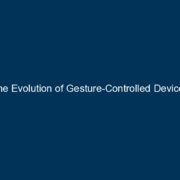In the ever-evolving landscape of healthcare, Artificial Intelligence (AI) has emerged as a transformative force, particularly in the realm of personalized medicine. This blog delves into the profound impact of AI on personalized medicine, exploring how advanced technologies are reshaping the diagnosis, treatment, and overall healthcare experience for individuals.
Understanding Personalized Medicine
Tailoring Treatment to Individuals
Personalized medicine, also known as precision medicine, revolves around tailoring healthcare decisions, practices, and interventions to the individual characteristics of each patient. This approach takes into account factors such as genetics, lifestyle, and environmental influences to design treatment plans that are specifically tailored to the unique needs of the patient. It represents a shift from the traditional one-size-fits-all approach to a more precise and targeted model of care.
AI in Diagnostics and Disease Prediction
Genomic Analysis with AI
One of the key contributions of AI in personalized medicine is its role in genomic analysis. AI algorithms can analyze vast genomic datasets to identify patterns, mutations, and genetic variations associated with specific diseases. This information is crucial for predicting disease risks, understanding genetic predispositions, and designing personalized treatment strategies based on an individual’s genetic makeup.
Early Disease Detection
AI-powered diagnostic tools play a pivotal role in early disease detection. Machine learning algorithms can analyze medical imaging data, such as MRIs and CT scans, to identify subtle signs of diseases at their nascent stages. This enables healthcare professionals to initiate interventions early, potentially preventing the progression of diseases and improving treatment outcomes.
Treatment Personalization with AI
Drug Discovery and Development
AI accelerates the drug discovery and development process in personalized medicine. By analyzing vast datasets related to molecular structures, drug interactions, and patient responses, AI algorithms can identify potential drug candidates more efficiently. This not only speeds up the drug development timeline but also facilitates the creation of targeted therapies based on the individual characteristics of patients.
Predictive Analytics for Treatment Outcomes
AI’s predictive analytics capabilities extend to forecasting treatment outcomes for individual patients. By considering a patient’s genetic profile, medical history, and other relevant factors, AI algorithms can predict how a patient is likely to respond to a specific treatment. This information empowers healthcare providers to make informed decisions about the most effective and personalized treatment options for each patient.
Enhancing Patient Engagement and Experience
AI-driven Personal Health Assistants
Personalized medicine isn’t limited to clinical settings—AI is also playing a role in enhancing patient engagement and self-care. AI-driven personal health assistants can provide individuals with personalized health recommendations, medication reminders, and lifestyle guidance based on their unique health profiles. This proactive approach to healthcare empowers individuals to take an active role in managing their well-being.
Remote Patient Monitoring
AI facilitates remote patient monitoring, allowing healthcare providers to track patients’ health status outside of traditional healthcare settings. Wearable devices equipped with AI algorithms can monitor vital signs, detect anomalies, and alert healthcare professionals to potential issues. This real-time monitoring enhances personalized care by providing continuous insights into a patient’s health.
Challenges and Considerations in AI-Powered Personalized Medicine
Data Privacy and Security
The integration of AI in personalized medicine raises concerns about data privacy and security. The vast amount of sensitive health data being processed and analyzed requires robust measures to safeguard patient information. Striking a balance between leveraging data for personalized treatment and ensuring patient privacy is a crucial consideration.
Interoperability of Systems
Ensuring interoperability between different AI systems and healthcare platforms is a challenge. Seamless integration and sharing of data across various healthcare providers and AI applications are essential for delivering a cohesive and comprehensive personalized medicine experience. Efforts to establish standardized protocols and data exchange mechanisms are ongoing to address this challenge.
The Future Landscape of Personalized Medicine with AI
Expanding Applications in Various Medical Fields
The future of personalized medicine with AI holds promises of further expansion into various medical fields. From oncology and cardiology to neurology and beyond, AI’s ability to analyze diverse datasets will contribute to the development of personalized treatment strategies for a wide range of medical conditions.
Integration of AI with Emerging Technologies
The synergy between AI and emerging technologies, such as blockchain and the Internet of Things (IoT), is likely to play a significant role in the evolution of personalized medicine. Blockchain can enhance the security and transparency of health data, while IoT devices can contribute to the continuous monitoring and collection of real-time health information.
Conclusion
In conclusion, the role of AI in personalized medicine is reshaping the landscape of healthcare, offering tailored and precise treatment approaches for individuals. From genomic analysis and early disease detection to drug discovery and patient engagement, AI is driving advancements that have the potential to revolutionize how we approach healthcare.
While challenges related to data privacy and system interoperability must be addressed, the trajectory of AI in personalized medicine indicates a future where healthcare is increasingly individualized, effective, and patient-centric. As technology continues to advance, the partnership between AI and personalized medicine holds the promise of ushering in a new era of healthcare tailored to the unique needs of each patient.



















Comments